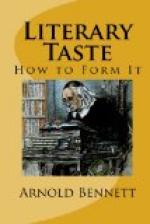Before you begin upon another masterpiece, set out in a row the masterpieces which you are proud of having read during the past year. Take the first on the list, that book which you perused in all the zeal of your New Year resolutions for systematic study. Examine the compartments of your mind. Search for the ideas and emotions which you have garnered from that book. Think, and recollect when last something from that book recurred to your memory apropos of your own daily commerce with humanity. Is it history—when did it throw a light for you on modern politics? Is it science—when did it show you order in apparent disorder, and help you to put two and two together into an inseparable four? Is it ethics—when did it influence your conduct in a twopenny-halfpenny affair between man and man? Is it a novel—when did it help you to “understand all and forgive all”? Is it poetry—when was it a magnifying glass to disclose beauty to you, or a fire to warm your cooling faith? If you can answer these questions satisfactorily, your stocktaking as regards the fruit of your traffic with that book may be reckoned satisfactory. If you cannot answer them satisfactorily, then either you chose the book badly or your impression that you read it is a mistaken one.
When the result of this stocktaking forces you to the conclusion that your riches are not so vast as you thought them to be, it is necessary to look about for the causes of the misfortune. The causes may be several. You may have been reading worthless books. This, however, I should say at once, is extremely unlikely. Habitual and confirmed readers, unless they happen to be reviewers, seldom read worthless books. In the first place, they are so busy with books of proved value that they have only a small margin of leisure left for very modern works, and generally, before they can catch up with the age, Time or the critic has definitely threshed for them the wheat from the chaff. No! Mediocrity has not much chance of hood-winking the serious student.
It is less improbable that the serious student has been choosing his books badly. He may do this in two ways—absolutely and relatively. Every reader of long standing has been through the singular experience of suddenly seeing a book with which his eyes have been familiar for years. He reads a book with a reputation and thinks: “Yes, this is a good book. This book gives me pleasure.” And then after an interval, perhaps after half a lifetime, something mysterious happens to his mental sight. He picks up the book again, and sees a new and profound significance in every sentence, and he says: “I was perfectly blind to this book before.” Yet he is no cleverer than he used to be. Only something has happened to him. Let a gold watch be discovered by a supposititious man who has never heard of watches. He has a sense of beauty. He admires the watch, and takes pleasure in it. He says: “This is a beautiful piece of bric-a-brac; I fully appreciate this delightful trinket.” Then imagine his feelings when someone comes along with the key; imagine the light flooding his brain. Similar incidents occur in the eventful life of the constant reader. He has no key, and never suspects that there exists such a thing as a key. That is what I call a choice absolutely bad.




